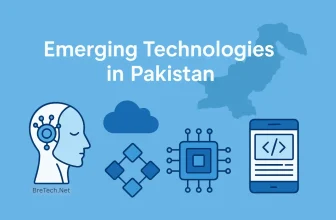Scope of AI in Pakistan now means more than headlines about chatbots. It affects how hospitals diagnose patients, how banks manage risk, how farms plan harvests, and how young people plan their careers. For students and professionals, AI is moving from theory into everyday tools.
In simple terms, AI in Pakistan is about using data and software to make faster decisions, reduce manual work, and open new jobs. From BS AI degrees to startup labs and government projects, the demand for skills and tools is rising every year.
This guide explains where AI is actually used in Pakistan, what kind of jobs and salaries are realistic, how universities are responding, and how practical AI software can fit into real work for creators, SMEs, and IT teams.
Quick answer: scope of AI in Pakistan
In 2026, the scope of AI in Pakistan touches four major areas:
- Healthcare: triage, medical imaging support, patient queues, and hospital logistics.
- Finance: fraud detection, credit scoring, chatbots, and anomaly alerts.
- Agriculture: crop-yield prediction, smart irrigation, and pest monitoring.
- Digital services: e-commerce recommendations, content tools, and workflow automation.
Around this, policy work, university research, and private-sector tools are building a wider AI ecosystem in Pakistan.
Scope of AI in Pakistan in 2026
The scope of AI in Pakistan has expanded from pilot projects to more serious deployments. Universities, startups, and government bodies now treat AI as a core part of digital transformation rather than a side experiment.
Recent policy work and planning documents outline goals for skills, ethics, and data-center capacity. Research hubs such as the National Center of Artificial Intelligence (NCAI) and BS Artificial Intelligence programs at major universities are producing more graduates each year.
For students searching “AI scope in Pakistan” or “future of AI in Pakistan,” this translates into two realities: more AI projects across industries and stronger competition for the best roles. The opportunity is real, but it now rewards practical skills and portfolio work, not buzzwords alone.
Understanding Artificial Intelligence and Why It Matters for Pakistan
Artificial intelligence is the broad term for systems that can learn from data, recognise patterns, and make decisions or recommendations. Inside AI you find fields like machine learning, natural language processing (NLP), and computer vision.
For Pakistan, AI matters because it helps deal with very local problems: overloaded hospitals, water stress in agriculture, manual back-office work, and limited staff in many government departments. When used well, AI can save time, reduce errors, and extend the reach of skilled professionals.
| Core concept | Simple meaning | Impact in Pakistan |
|---|---|---|
| Machine learning | Models that learn patterns from data. | Better credit scoring, medical triage, and forecasting. |
| Natural language processing | Systems that read or generate text and speech. | Urdu/English chatbots, document search, and support desks. |
| Computer vision | AI that “sees” in images or video. | Crop-disease detection, CCTV analytics, and medical imaging. |
The current AI landscape in Pakistan
The AI landscape in Pakistan is still young but moving fast. Large organisations experiment with in-house models or cloud APIs, while smaller teams rely on packaged AI tools that sit inside existing software.
Banks, telecoms, and large retailers already use AI quietly in risk, marketing, and support. Startups test AI in logistics, agriculture, and education. On the public side, research labs and pilot projects explore traffic monitoring, citizen services, and document processing.
Key AI technologies shaping the country
Three practical technologies dominate current AI usage in Pakistan:
- Predictive models that score risk or forecast events, such as loan defaults or wheat yields.
- Chatbots and assistants that reduce load on human agents in banking, telco, and e-commerce.
- Vision systems that scan documents, fields, and CCTV streams for patterns and alerts.
Most of these rely on cloud infrastructure and require solid data pipelines, which is why data engineering skills sit next to AI roles in many job ads.
Leading initiatives and companies
Alongside global cloud platforms, local providers supply AI-powered software to businesses and individuals. BreTech focuses on genuine licensed tools that pack AI features into everyday apps for creators, IT teams, and SMEs.
Brands like Movavi, EaseUS, and Vidnoz give Pakistani users access to practical AI features in video editing, recovery, and content creation with PKR billing and local support instead of risky cracked software.
Research hubs such as NCAI, university labs, and private R&D teams work on local problems: Urdu OCR, crop-disease detection, traffic monitoring, and domain-specific chatbots. Together, they form the base layer that future products and startups can build on.
Real AI applications in Pakistan’s major sectors
AI in Pakistan is most visible where there is data, repeatable decisions, and pressure on human staff. Three sectors show this clearly: healthcare, finance, and agriculture.
AI in healthcare, finance, and agriculture
In healthcare, AI supports rather than replaces doctors. Models help flag risky cases, suggest triage priorities, and support radiologists with decision-support tools. Hospitals also use simple machine learning to manage queues, beds, and pharmacy stock.
In finance, AI powers fraud detection, transaction scoring, and customer-service bots. Banks and fintechs use models to rank loan applications, detect unusual activity, and respond to thousands of routine queries each day.
In agriculture, AI models track weather, soil, and satellite data to predict yields and recommend actions. Local work on wheat-yield forecasting has shown how district-level predictions can support food-security planning and water use.
AI in retail, energy, and public services
Retail and e-commerce platforms rely on recommendation engines, search optimisation, and demand forecasting. For customers, this shows up as “you might also like” sections and better-timed promotions.
Energy and utilities use AI for load forecasting, predictive maintenance, and loss detection. Over time, this can reduce outages and improve planning. Public-sector pilots explore document processing, analytics dashboards, and routing of citizen queries.
AI careers, jobs, and salaries in Pakistan
Because AI sits on top of data and software, many AI jobs in Pakistan are extensions of existing IT and analytics roles. The highest demand is in teams that can ship real projects, not just research slides.
High-demand AI roles in Pakistan
Common titles include data scientist, machine learning engineer, AI engineer, data analyst with ML exposure, and MLOps engineer. On the product side, AI product managers and technical project managers are becoming more visible.
Most of these roles expect a mix of Python, SQL, statistics, basic deep-learning frameworks, and solid communication skills. For early-career professionals, strong projects or internships often matter more than degree labels.
AI salaries and growth trends
Salaries for AI-related roles in Pakistan usually sit above equivalent non-AI IT roles at the same experience level. Pay ranges depend heavily on city, employer, and whether work is remote for foreign clients.
What matters most is growth: people who can move from “hello world” notebooks to production AI projects tend to move up faster, switch into better firms, or take on regional responsibilities.
Career paths for AI professionals
Typical paths include:
- CS or BS AI graduate → junior data analyst → data scientist / ML engineer.
- Software engineer → backend engineer with ML integration → MLOps or AI platform engineer.
- Domain expert (finance, health, operations) → analytics specialist → AI product owner.
Each path benefits from continuous learning plus real portfolio pieces: small models, dashboards, or workflows that solve a clear business problem.
AI education and university programs in Pakistan
Universities in Pakistan now treat AI as a first-class discipline rather than a side course in CS. Multiple institutions run BS Artificial Intelligence programs alongside CS and data-science tracks.
Undergraduate courses cover programming, linear algebra, probability, and core AI topics like machine learning, NLP, and computer vision. Labs, capstone projects, and hackathons give students limited but useful real-world exposure.
Building skills beyond the degree
Because AI tools change quickly, students and professionals cannot rely on degrees alone. Short courses, open-source projects, and internships with local firms help convert theory into practice.
Strong candidates usually combine three things: a clear understanding of fundamentals, hands-on experience with open-source tools, and the ability to explain models to non-technical people.
AI research and collaboration
Research centres such as NCAI connect universities and industry. They run funded projects, host internships, and support prototypes in agriculture, health, language tech, and smart cities.
For students, these centres can be a good route into research-oriented careers or PhD tracks; for companies, they are a way to test ideas without building a full in-house team at the start.
From theory to tools: practical AI software for creators and SMEs
Not every AI career in Pakistan starts in a research lab. Many people first touch AI through creative and productivity tools that hide the complexity behind simple interfaces.
Examples include:
- AI photo editors that clean images, remove backgrounds, and enhance portraits for e-commerce and social media.
- AI voice tools like EaseUS VoiceWave AI Voice Changer that improve recordings, remove noise, or change voice tone for content creators.
- AI avatar and video tools such as Vidnoz AI Starter Plan that convert scripts into explainer videos without a full studio.
BreTech focuses on genuine, licensed versions of these tools so Pakistani users can skip risky cracked software and access updates and support. For many freelancers, YouTubers, and SMEs, this “applied AI” is the most direct path to higher income.
If you want to go deeper into creative AI tools, start with BreTech’s video editing software collection and photo editing tools, then explore brand hubs like Movavi, EaseUS, and Vidnoz.
Future of AI in Pakistan: opportunities and challenges
The future of AI in Pakistan depends on how well the country can balance ambition with basics: skills, infrastructure, and ethics.
Opportunities for innovation and national growth
With a young population and strong interest in IT, Pakistan can use AI to improve public services, export digital skills, and support local products. Areas like agriculture, health, logistics, and language tech offer clear room for innovation.
Government planning around AI data-center capacity and skills development shows that AI is now part of long-term infrastructure discussions, not just short-term pilots.
Challenges the AI sector must address
Major challenges include uneven maths and coding preparation, patchy data quality, and weak governance around privacy and bias. Without careful design, AI systems can bake existing inequalities into automated decisions.
Closing these gaps requires better basic education, clear data-protection laws, transparent procurement, and more collaboration between universities, companies, and regulators.
Conclusion: unlocking Pakistan’s AI potential
Pakistan’s AI potential is real but will only be unlocked through consistent, practical work. The combination of young talent, growing connectivity, and active policy discussion is a strong base, but success depends on implementation.
For students, that means focusing on skills and projects rather than buzzwords. For companies, it means starting with one or two clear use cases, picking reliable tools, and measuring real outcomes. For policymakers, it means supporting infrastructure, ethics, and open collaboration.
If these pieces move together, AI can help Pakistan reduce friction in services, create better jobs, and compete more effectively in global digital markets—while staying grounded in local needs rather than imported hype.
FAQs
Q: What is the current scope of AI in Pakistan?
A: AI is now used in healthcare, banking, agriculture, retail, and public services, with more pilots moving into production as data and skills improve.
Q: Is AI a good career choice in Pakistan?
A: Yes, AI-related roles usually pay better than standard IT jobs, but they demand strong maths, coding, and problem-solving skills plus real project experience.
Q: Do I need a BS in Artificial Intelligence to work in AI?
A: A BS AI helps, but many professionals come from CS, software engineering, or data-science degrees and then specialise through courses, projects, and on-the-job work.
Q: What entry-level AI skills should students in Pakistan focus on?
A: Start with Python, SQL, statistics, and basic machine-learning libraries, then build small projects that solve real problems in finance, health, operations, or media.
Q: How is AI being used in healthcare and agriculture in Pakistan?
A: Hospitals test AI for triage and imaging support, while agriculture projects use models to forecast yields, monitor crops, and plan water use more efficiently.
Q: Can small businesses in Pakistan benefit from AI without big budgets?
A: Yes, SMEs can start with packaged AI tools—such as AI photo editors, voice tools, and analytics features inside existing software—rather than building custom models.
Q: What are the biggest challenges for AI adoption in Pakistan?
A: Skills gaps, inconsistent data, legacy systems, and limited governance around privacy and bias are the main hurdles; addressing them is key to safe, long-term growth.
Further Reading
Want to learn more about AI and digital trends in Pakistan? Check out these helpful posts:
- Vidnoz AI Avatars in Pakistan
- Emerging Technologies in Pakistan
- AI in Remote Work for Pakistani Professionals
- AI Video Editing Tools in Urdu for Creators in Pakistan
- AI Video Creation Tools With Urdu Voiceover in Pakistan
For more helpful guides, visit our Industry Trends blog category.






